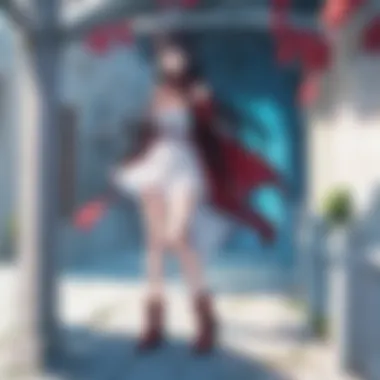An In-Depth Analysis of 'Gate' by Funimation


Intro to the Series
The anime series Gate: Thus the JSDF Fought There! is both an action-packed fantasy adventure and a political commentary. It first aired in Japan in 2015, adapted from the ongoing manga and light novel series written by Takumi Yanai. Set against the backdrop of a portal that connects modern Japan to a fantasy world, the series navigates through the intersection of technology and magic, presenting a fascinating blend of genres.
The story begins when a mysterious gate opens in Tokyo, unleashing fantastical creatures and armies into the real world. The Japan Self-Defense Forces (JSDF) are then tasked with entering this new realm to protect their homeland, which leads to intense battles and diplomatic encounters.
The popularity of Gate can be attributed to its unique premise that resonates with both anime fans and those interested in military and political themes. The series has garnered a mix of praise and criticism over the years, especially considering its exploration of military intervention and cultural clashes. While viewers appreciate its engaging narrative and character dynamics, some critiques focus on the handling of certain political themes and the portrayal of military force.
Overall, the series achieved significant viewership and sparked discussions among fans regarding its thematic depth and complexity. This context will enrich our exploration of its narrative elements and Funimation’s critical role in its localization and distribution.
Staff and Cast Details
The production team behind Gate plays a crucial role in shaping its success. Directed by Takahiko Kyogoku, who is known for his attention to character detail and pacing, the series displays effective storytelling techniques. The character designs, which are pivotal to the anime's appeal, were crafted by the talented Yoshinori Shizuma.
Key voice actors include:
- Toshiyuki Morikawa as Youji Itami
- Takahiro Mizushima as Tuka Luna Marceau
- Risa Taneda as Lelei La Lalena
The voice cast brings layers to their characters, enhancing emotional connections with the audience. Behind the scenes, the contributions of the production team, including animators and sound designers, ensure the series remains artistically engaging.
Theme Music Analysis
The theme music of Gate significantly contributes to its storytelling. The opening theme, "Gate (Sore wa Akatsuki no Yona)" performed by the band Konomi Suzuki, encapsulates the spirit of adventure and the duality between the worlds.
On the other hand, the ending theme, "Sukiyaki" by the artist Aimer, offers a more reflective tone, inviting viewers to contemplate the series’ deeper messages. The composers skillfully weave in elements that echo the narrative themes, allowing the music itself to act as an extension of the story.
Plot Summary and Analysis
At its core, Gate centers around Youji Itami, a middle-aged officer in the JSDF who is initially portrayed as disinterested in military glory. However, his journey evolves as he engages with both fantastical beings and complex political scenarios. The narrative explores critical story arcs, including Itami's encounters with the various factions within the fantasy realm and his struggle to balance military authority with compassion.
Significant plot twists include the introduction of key characters such as Tuka, a high elf, and Lelei, a talented magician. Additionally, the series highlights the clash of cultures as Itami seeks to establish alliances while navigating the politics of both worlds. Narrative techniques, including heavy reliance on dialogues and strategic pacing, develop strong character arcs that resonate with viewers.
Reception and Impact
The reception of Gate has been polarized. Critics have given it a range of ratings, often praising the character development while questioning its approach to military themes and representation. The anime's impact extends beyond mere entertainment; it has stirred debates throughout anime communities regarding ethics in warfare and cultural representation.
Comparatively, Gate stands in a unique position within the anime genre, often discussed alongside works like Sword Art Online and Re:Zero - Starting Life in Another World. Its significance arises not only from its narrative style but also from the cultural conversations it ignites among fans.
"This series invites viewers to explore the consequences of invasion, yet it entertains without compromising on engagement."
Intro to Gate
The topic of Introduction to Gate is fundamental for understanding the wider implications of the series within the anime landscape. This section serves to establish the framework for the discussion that will follow, highlighting core elements like narrative richness and character complexity. It is crucial for both new viewers and long-term fans because it lays the groundwork for the analysis of the series’ impact and relevance.
Overview of the Series
Gate is an anime series adapted from the manga by Takumi Yanai. The story centers around a portal that unexpectedly opens in the middle of Tokyo, connecting the real world with a fantasy realm inhabited by mythical creatures and warriors. This premise sets the stage for an exploration of what happens when modern society encounters a world steeped in magic, offering a unique blend of military tactics and fantasy elements. The protagonist, Youji Itami, is a Japan Self-Defense Force officer whose journey begins when he leads a mission into the gate. His experiences on the other side of the gate shape not only his character but also the outcome of the conflicts that arise.
The show gained attention for its intricate plot and various colorful characters, drawing in a diverse audience who appreciate both action and thought-provoking narratives. Overall, Gate presents a complex interplay between cultures, blending realism with elements of the fantastical.
Themes and Motifs
Gate delves into several pertinent themes. One prominent theme is the nature of conflict. The series raises questions about the morality of war, exploring the stark differences in ideology between the two worlds. Through its storyline, it examines how power dynamics shift when advanced technology meets ancient magic.


Another significant motif is cultural exchange. The interactions between the two worlds serve as a narrative vehicle to reflect on how societies can learn from one another, despite their differences. It summarizes the idea that mutual understanding can bridge divides, even in extreme circumstances.
"It's a clash of worlds that prompts both sides to reconsider their values and beliefs."
The series also incorporates political commentary, subtly critiquing contemporary issues through its narrative. By presenting a world where Japanese military forces engage with fantastical entities, the anime invites viewers to reflect on real-world alliances and conflicts, making it a relevant conversation piece in today’s socio-political context.
Together, these themes and motifs enrich the storyline, making Gate a compelling study of human nature amidst fantastical circumstances.
The Narrative Structure
Understanding the narrative structure of a series is crucial, as it serves as the backbone that holds the entire story together. In Gate, the narrative is defined by its unique blend of fantasy and reality, bringing two disparate worlds together. This article will dissect how this structure not only shapes the plot but also influences character development and thematic exploration. By examining the intricacies of the narrative, we can appreciate the artistic choices made by the creators and their contributions to the overall impact of the series.
Plot Summary
Gate revolves around a sudden incursion of a mystical portal that opens in modern Japan. This portal leads to a fantasy realm filled with magic, mythical creatures, and medieval societies. At the center of the story is Youji Itami, a Japanese Self-Defense Forces officer, who becomes an unlikely hero tasked with exploring the new world. As the story unfolds, Itami navigates various challenges, including political tension and cultural clashes, resulting in personal growth and deepening relationships with the inhabitants of the fantasy world. The succinct yet engaging plot draws viewers in while offering rich layers of commentary on societal norms.
Character Progression
Character development in Gate is notably significant. The series centers on Youji Itami, whose growth from a laid-back otaku to a responsible leader forms the essence of the narrative. As the plot progresses, Itami encounters several key characters that further his journey. These include the fierce warrior Lelei La Lelena and the strong yet compassionate Tuka Luna Marceau. Through their interactions, viewers see how each character evolves, confronting their past and forging new identities. The intricacies of their backstories come to light in critical moments, enriching the narrative. This multifaceted character progression adds depth, making Gate more than just a simple fantasy tale.
Conflict and Resolution
Conflict in Gate typically arises from the friction between the modern world and the medieval fantasy setting. Central conflicts touch on themes of trust, diplomacy, and the nature of warfare. For instance, Itami and his team must navigate the complexities of engaging with a foreign nation while also confronting aggressors. The resolution of these conflicts often emphasizes cooperation over confrontation, showcasing that understanding and dialogue can bridge vast cultural divides. This approach not only drives the plot but also delivers meaningful messages about human connections, making Gate both entertaining and thought-provoking.
Character Analysis
Understanding the characters in Gate provides significant insights into the show's themes and storytelling techniques. Characters are not merely vehicles for the plot; they embody the complexities of the narrative and reflect broader societal issues. This section offers an analytical view of the characters, focusing on their development, roles, and motivations. By examining both protagonists and antagonists, one can appreciate the depth and multifaceted nature of the story.
Protagonist Overview
The central figure in Gate is Yoji Itami, a Japan Self-Defense Forces officer. Itami serves as a bridge between the real world and the fantastical elements of the show. His character is notable for his pragmatic approach to the challenges he faces. Rather than embodying raw power or heroism, he exhibits a level-headedness that invites viewers to connect with his journey on a personal level. This approach helps ground the series in reality, contrasting the more fantastical elements present in the other realms.
Yoji's motivations are initially rooted in his desire for military interest and protection of his homeland. However, as the story progresses, he evolves into a more complex character. His interactions with the local inhabitants reveal a more humanitarian side, showcasing his capacity for empathy and understanding. This duality in characterization prompts the viewer to consider what it means to be a hero, as well as the moral implications of military intervention.
Supporting Characters
Gate boasts an array of supporting characters that enrich the narrative. Each character brings their own unique traits, motivations, and arcs that contribute to the overall story.
- Lelei La Lalena: A young mage with exceptional intelligence. Lelei's fascination with the new world ignites a passion for knowledge, significantly emphasizing educational themes in the series.
- Tuka Luna Marceau: A survivor of tragedy in her homeland. Her character adds layers of emotional depth and underscores themes of loss and resilience. Her development throughout the series raises questions about healing and recovery.
- Schwarz: The warrior who exemplifies traditional strength but is later revealed to possess a caring and protective nature. This duality complicates the binary of good versus evil, inviting the audience to explore nuanced moral landscapes.
These characters complement Itami's narrative while also occupying valuable thematic space, presenting various perspectives on the realm’s conflicts and cultural differences. Their relationships with Itami highlight essential values such as friendship, loyalty, and sacrifice.
Antagonists and Their Motivations
In Gate, the antagonists contribute significantly to the conflict and narrative tension. Understanding their motivations provides clarity regarding the choices made by the protagonists.
- The Empire of the Ginza Gate: Representing the force of colonialism and ambition, the empire stands as a symbol of political and military dominance. Their willingness to exploit the magical realm showcases the darker aspects of power dynamics.
- Demon Lords: Characters like the Demon Queen are not motivated solely by chaos or destruction; instead, they possess backgrounds that evoke sympathy and understanding. Their desire for domination stems from their need to protect their realm and identity, thus blurring the lines between good and evil.
- Self-Interest vs. Ideals: Many antagonists in Gate harbor ambitions that contrast with the protagonists' more altruistic motives. This clash highlights the conflict between self-interest and greater good, presenting a critique of imperialist motives in a fantastical setting.
"In Gate, every character, regardless of their role, provides a lens through which themes of identity, morality, and humanity can be explored."
By analyzing these characters and their motivations, viewers gain greater insight into the narrative’s depth. The series becomes a mirror reflecting various human experience, prompting discussions about morality, governance, and cultural interaction that remain pertinent today.
Visual and Production Analysis


In analyzing the anime series "Gate," it is essential to look closely at visual and production elements. These aspects not only define the aesthetic appeal but also significantly influence viewer engagement and storytelling effectiveness. Visual and production analysis covers various components such as animation quality, art style, sound, and the contributions from the production team. Together, they impact the overall reception of the series. A well-executed visual presentation can enhance the narrative, while poor production values can detract from the storyline and character development.
Art Style and Animation Quality
"Gate" presents a unique blend of modern and fantasy design. The art style effectively captures both the contemporary setting of Japan and the mythical world introduced through the Gate. The character designs reflect distinct traits that align with their backgrounds, making it easier for viewers to grasp their roles. For example, the protagonist, Yoji Itami, appears more ordinary in contrast to the vibrant visuals of the fantasy world, emphasizing his dual existence.
The animation quality remains consistent throughout the series, though some episodes display noticeable fluctuations. Key action sequences are often fluid, contributing to a heightened sense of excitement. However, some background scenes may lack detail, which slightly impacts immersiveness. A close examination reveals that several battle scenes utilize dynamic angles, enhancing energy but at times sacrificing clarity in fast-paced moments.
Sound Design and Music
Sound design plays a crucial role in establishing the atmosphere within "Gate." The series features a mix of orchestral and contemporary music scores, blending together to create an engaging listening experience. The opening and ending themes are thoughtfully selected, showcasing both emotional resonance and cultural significance. This choice reflects Japanese pop culture and resonates with its audience.
Moreover, the sound effects enhance the experience, from the clashing of swords during battles to the ambient noise of the fantasy world. The voice acting supports characters' emotions and motivations, ensuring that the audience perceives genuine reactions. Voice actors work to convey nuances that add depth to their roles, allowing viewers to connect better with the psychological dynamics at play.
Direction and Production Team Contributions
The direction of "Gate" showcases the vision of its creators and the talent behind the scene. Tatsumi Minakawa, the director, has a keen understanding of balancing storytelling with visual elements, ensuring the audience remains engaged. The production team at A-1 Pictures is noteworthy, as they have a reputation for quality animation and storytelling.
Their collaboration employs innovative techniques, enhancing the visuals without overwhelming the narrative flow. Each episode reflects a commitment to craftsmanship, and the attention to detail in both character movements and scenic compositions helps ground the fantastic elements in a relatable context.
"A successful series requires not just a good script but an equally strong production team that can bring that vision to life.” - Animation Expert
In summary, the visual and production aspects of "Gate" are multifaceted and demand careful dissection. The unique art style pairs well with competent animation quality, while sound design and direction also bolster the series' impact. Understanding these elements is vital for appreciating how "Gate" successfully resonates with its audience.
The Role of Funimation
Understanding the significance of Funimation's role in the adaptation of Gate involves various factors that contribute to both the series' localization process and its overall reception. Funimation is not just a distributor; it is a bridge between the anime and its audience, particularly for English-speaking fans. Their methods directly impact how diverse audiences perceive the series.
Funimation’s contribution encompasses translation, cultural adaptation, and marketing strategies. Each of these components is crucial for presenting the story and its elements accurately while making them accessible to non-Japanese viewers. The subtitling and dubbing, for example, require linguistic precision along with a sensitivity to cultural nuances, ensuring that the soul of the original content is maintained.
Funimation's Localization Approach
The localization approach taken by Funimation for Gate exemplifies the blend of fidelity to the source material with necessary adjustments for the target audience. This is important because localization is not merely about translating dialogues. It includes considerations such as cultural context, humor, and idiomatic expressions, which might not resonate well in the target language.
To achieve this, Funimation employs experienced translators and adaptation specialists who are dedicated to maintaining the integrity of the original dialogue. They often conduct thorough analyses of the source material to understand character motivations and thematic elements. In Gate, this meant grappling with nuanced political themes and complex relationships, all while ensuring that the humor and action were conveyed effectively.
Moreover, Funimation also invests in voice casting, striving to find actors whose performances align with the characters as they were intended. The choices made here can significantly impact audience reception. The consideration of regional accents and performance styles adds another layer of authenticity that connects viewers more deeply with the characters.
Impact on Audience Reception
The effects of Funimation's localization strategies can be seen in audience reception and critical reviews. A well-executed localization helps fans relate better to the series, enriching their viewing experience. The careful translation of themes, particularly those dealing with politics and cultural identity, can prompt viewers to engage in discussions about deeper societal issues presented in Gate.
Numerous viewer reviews highlight how the localization contributed to their enjoyment of the series. When localization resonates, it often results in a positive response from audiences. Fans discuss how Funimation's efforts led to an appreciation of the original narrative, noting the careful balance they struck between fidelity and accessibility. This exchange creates a community of viewers who feel invested not just in the series, but in the discussions it sparks.
"Localization is often the unsung hero of anime adaptation. Funimation’s ability to adapt cultural content for different audiences is essential for broader understanding and acceptance of shows like Gate."
In summary, Funimation’s role in the adaptation of Gate is multifaceted and crucial. Its localization approach affects how viewers interpret and resonate with the series. This has lasting implications on the success of the show and its impact within the wider cultural context.
Cultural Context and Relevance
The cultural context of an anime series like Gate is crucial for understanding its impact and significance within both the anime community and the wider media landscape. Recognizing how Gate fits into various cultural narratives allows viewers to appreciate its themes, character arcs, and unique storytelling. In this section, we will explore the relevance of Gate in relation to the isekai genre, as well as its insights into political and social issues present in contemporary society.
Gate in the Context of Isekai Genre


Gate presents a unique addition to the isekai genre, which traditionally deals with characters being transported to fantastical worlds. The premise of Gate centers around a portal that opens in modern-day Tokyo, leading to a world filled with magic and mythical creatures. This juxtaposition of the real world and the fantasy realm adds layers to the narrative, setting it apart from other isekai narratives.
The series uses this setup to explore themes related to cultural exchange and the consequences of imperialism. It cleverly critiques the notion of the "other" often present in fantasy settings by portraying both worlds with complexity and moral ambiguity. The protagonist, Youji Itami, is not just an adventurer; he is also a member of the Japan Self-Defense Forces. This duality allows viewers to see the effects of a military presence in another culture and questions the righteousness of intervention.
Furthermore, Gate reflects broader trends in the isekai genre, such as the blend of military and fantasy elements, appealing to fans who enjoy strategic warfare alongside traditional fantasy tropes. As such, it invites analysis of how isekai narratives can impact perceptions of real-world issues while engaging viewers with fantastical storytelling.
Political and Social Commentary
Gate also serves as a platform for political and social commentary. The narrative addresses complex and often controversial themes such as nationalism, military ethics, and the interplay between cultures. The depiction of a military force interacting with a foreign fantasy society compels the audience to confront their views on power dynamics and engagement.
One of the highlights of Gate is its exploration of how different cultures respond to technology and military might. The assertion of Japanese military authority over a fantastical realm illustrates a stark contrast between advanced societies and those reliant on magic. These elements raise questions about colonialism and the moral implications of using force to achieve peace.
The anime portrays various characters from the fantasy world, showcasing their struggles and aspirations while highlighting the potential for collaboration across cultural boundaries. This approach provides a nuanced view of how misunderstanding and empathy can coexist, ultimately enhancing viewers’ understanding of social dynamics.
"Through the lens of fantasy, Gate reflects real-world tensions, merging entertainment with a critical examination of society."
The series does not shy away from addressing the darker aspects of human nature, providing commentary on war, governance, and the influence of media. As anime continues to evolve, productions like Gate present opportunities to reflect on societal challenges while entertaining audiences.
Viewer Perspectives
Understanding viewer perspectives is essential when analyzing Gate. It allows us to explore how the audience interprets, interacts with, and critiques the series. This section lays the groundwork for analyzing the collective sentiments and theories that fans and critics share. The perspectives will reveal the culturally significant aspects of the show and the dynamics of community discussions surrounding it. Notably, the opinions shared by viewers highlight the varied experiences and expectations that audiences bring to Gate, enriching the narrative while simultaneously shaping its place within the broader anime discourse.
Fan Theories and Discussions
Fans of Gate have engaged in numerous discussions and theories that dissect the intricacies of the plot and characters. One popular line of thought revolves around the dynamics between the modern world and the fantasy realm. Viewers often debate the implications of a military presence in a magical world and how this influences both characters and the storyline.
Some theories suggest that certain characters represent real-world ideologies or political statements. For instance, debates about the portrayal of military conflicts reflect modern geopolitical issues. Fans often refer to specific episodes and scenes to support their theories, contributing to a rich tapestry of analysis. This active discussion fosters a community that is both passionate and thoughtful, providing a platform for collaborative interpretation.
Moreover, major forums such as Reddit serve as a valuable resource for fans to share their insights and theories. Many threads are filled with detailed breakdowns of episodes, character motivations, and the implications of specific events. These discussions not only deepen individual viewer’s understanding but also promote a sense of camaraderie among fans.
Critical Reception and Reviews
The critical reception of Gate has been multifaceted, influenced by both its narrative choices and the cultural backdrop within which it was released. Critics commonly point out the series' unique blend of fantasy and military themes, noting its ambition in weaving complex sociopolitical discussions into a narrative aimed primarily at entertainment.
Several reviews praise the series for its character development, especially in how it showcases the interactions between socially different groups. For instance, the growth arcs of supporting characters often receive acknowledgment for adding depth to the plot.
On the contrary, some reviewers express concern over perceived glorification of militarism. This critique causes some audiences to reevaluate what underlying messages the series portrays. As opinions diverge, the critical reception acts as a dual lens—both informing and reflecting viewer perceptions.
Furthermore, sites like Rotten Tomatoes and specialized anime review platforms frequently aggregate these opinions, enhancing a collective sense of understanding regarding Gate's impact. Reviews ultimately shape how new audiences approach the series, guiding initial expectations and influencing overall reception.
Culmination
The conclusion serves as a critical synthesis of the insights garnered throughout this analytical review. It encapsulates the essence of the series and its adaptation by Funimation, emphasizing key thematic elements, character progression, and viewer reception. This section acts as a bridge, connecting earlier sections and reiterating essential aspects that contribute to the understanding of "Gate" within the broader anime landscape. By distilling complex narratives into digestible points, the conclusion enhances the article’s value to both seasoned fans and newcomers.
Reflections on the Series’ Impact
"Gate" has left a significant mark on the anime community since its release. The series not only entertained but also engaged viewers with its exploration of military and fantasy themes. It has sparked discussions and debates surrounding its cultural implications, particularly in the realm of isekai. The fans often appreciate the juxtaposition of real-world military strategy against a fantastical backdrop. This unique angle provides insight into how military strategy could unfold in fantasy scenarios, creating a rich ground for analysis and interpretation.
The series' impact also extends to the representation of various cultures. While it portrays certain stereotypes, it also opens avenues for discussions about cultural appreciation versus appropriation. Many viewers have taken to platforms like Reddit and Facebook to express their thoughts and share theories, indicating the deep engagement of the audience with the content. In this way, "Gate" has not only served as entertainment but also as a catalyst for serious conversations on military ethics, cultural representation, and the complex interplay between reality and fantasy.
Future Prospects for the Franchise
The prospects for "Gate" as a franchise appear promising. Given the solid fanbase and ongoing discussions, there is a clear appetite for more content. Potential future adaptations or manga continuations could delve deeper into unexplored characters or situations, broadening the narrative scope. Furthermore, the success of similar titles in the isekai genre suggests that the market for such stories continues to thrive.
In addition, with the growing popularity of anime globally, the demand for localized versions may lead Funimation to consider expanding the franchise further. Collaborations, merchandise, and even possible spin-off series could be viable avenues.
"The ability of a series to evolve beyond its initial run speaks volumes about its significance in the genre."
In summary, while "Gate" has firmly established itself within the anime realm, its journey is far from over. Engaging narratives and rich thematic explorations lay the groundwork for its future. The franchise holds a robust potential for expansion, ensuring that both loyal fans and new audiences may continue to find value in its storytelling.













